The 51st Session of the Human Rights Council
12th September – 7th October 2022
Agenda Item 9: Enhanced Interactive Dialogue with the High Commissioner and the International Independent Expert Mechanism to Advance Racial Justice and Equality in Law Enforcement
3rd October 2022
By Martin Browne / GICJ
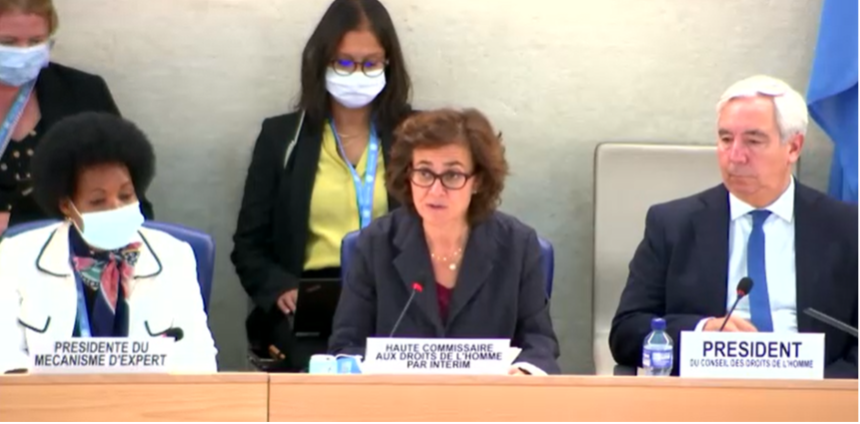
Executive Summary
The International Independent Expert Mechanism to Advance Racial Justice and Equality in the context of Law Enforcement was established in 2021 as part of the High Commissioner’s four-point agenda to end systemic racism and following a number of high profile and often deadly human rights violations by law enforcement officers against Africans and people of African descent.
The first report of the Mechanism was published in 2022. This report covered a wide-ranging area and was entitled “Promotion and protection of the human rights and fundamental freedoms of Africans and of people of African descent against excessive use of force and other human rights violations by law enforcement officers through transformative change for racial justice and equality”. The Acting High Commissioner, Nada Al-Nashif, presented the report starting with examples of best practice that had been identified through the Mechanism’s first 12 months of operations. These examples indicated the promise of constructive changes for law enforcement officers to adopt a human rights approach to eliminating racial discrimination in areas of their work but they were few in number and of limited geographic scope. Even where best-practice had been identified the evaluation of those local or national programmes had only just begun.
The overarching gaps in knowledge about the impact of human rights violations against people of African descent by law enforcement officers stemmed from the lack of consistent data about interactions and incidents that was disaggregated by race or ethnic origin. Accordingly, one of the Mechanism’s strongest recommendations urged national action plans against racism to include guidelines on how to collect, analyse, and publish data disaggregated by race or ethnic origin.
A second focus concerned the types of racial profiling, types of excessive use of force, and other violations of international human rights law, during and after interactions with law enforcement officials. The Mechanism called on more states to engage with country visits as a vital step to allow it to help strengthen the capacity of states to respond and align better to international standards on investigations, accountability, and standards governing law enforcement and the use of force.
Finally, the Acting United Nations High Commissioner for Human Rights called on States to engage meaningfully with the Expert Mechanism to Advance Racial Justice and Equality in Law Enforcement and take heed of the targeted recommendations that had been proposed through the Mechanism’s work including through sustained funding, public recognition of the serious of the issues, protection and support for programmes in this area.
Position of Geneva International Centre for Justice
More countries need to join the fight against egregious police brutality. Without urgent action across different states, the international community will have to consider a new international instrument - a convention against police brutality, which would bring to light the ways that international human rights are violated by police forces.
Geneva International Centre for Justice strongly believes that states should listen and act upon the concerns raised by people of African descent, and take measures on the ground, including concrete measures to reverse cultures of denial, to dismantle systemic racism, to end impunity for violations by law enforcement officials, and to deliver reparatory justice.
Background
The International Independent Expert Mechanism to Advance Racial Justice and Equality in the context of Law Enforcement was established in 2021 as part of the High Commissioner’s four-point agenda to end systemic racism and human rights violations by law enforcement against Africans and people of African descent. This focus followed the urgent debate held in June 2020 following high-profile murders of people of African descent by law enforcement officials, particularly in the USA.
The Mechanism’s initial 3-year mandate is detailed in resolution 47/21 to further transformative change for racial justice and equality in the context of law enforcement globally, especially where relating to the legacies of colonialism and the transatlantic slave trade. It also seeks to further “investigate Governments’ responses to peaceful anti-racism protests and all violations of international human rights law and to contribute to accountability and redress for victims”. Further functions detailed in the mandate include monitoring implementation of recommendations to end impunity of law enforcement officials, and to ensure concrete steps are taken to ensure access to justice, accountability and redress for excessive use of force and other violations against Africans and people of African descent.
First Report of the Independent Expert Mechanism to advance Racial justice and Equality in Law Enforcement
The first report of the Mechanism covered a wide-ranging area entitled “Promotion and protection of the human rights and fundamental freedoms of Africans and of people of African descent against excessive use of force and other human rights violations by law enforcement officers through transformative change for racial justice and equality”.
The Acting High Commissioner, Nada Al-Nashif, presented the report starting with examples of best practice that had been identified which indicated the promise of constructive changes for law enforcement officers to adopt a human rights approach to eliminating racial discrimination in areas of their work.
In British Columbia, a new system was introduced to collect, use, and analyse disaggregated data to identify and eliminate systemic racism in government programmes, Sweden had initiated an evaluation of the use of ethnic profiling by police. The Acting High Commissioner also outlined that certain measures had also been taken to confront legacies of enslavement; in Colombia where the Commission for the Clarification of Truth, Coexistence and Non-Repetition had held recognition forums and hearings, and carried out coexistence initiatives to raise awareness of the true experiences of Afro-Colombians. Such responses, she reported, demonstrated that concrete steps to address racial discrimination could be initiated despite complex national contexts and other major global challenges. However, unless they were part of comprehensive, multi-pronged approaches, they remained insufficient to dismantle the entrenched structural racism that had existed for centuries.
Despite these positives, the Acting High Commissioner remained deeply concerned that Africans and people of African descent continued to face disproportionate and discriminatory outcomes in many countries with regular reports of deaths and injuries received during or following encounters with law enforcement officials. She demonstrated her point by outlining the inadequate response of justice and political systems to seven “emblematic” cases of deaths including George Floyd and Breonna Taylor. Comprehensive data disaggregated by race or ethnic origin was crucial, but remained scarce and was a significant impediment to tackling tangible manifestations of systemic racism. Finally, robust measures to ensure accountability and redress for all victims and their families were critical.
The Acting High Commissioner concluded, noting that the OHCHR was intent on further strengthening capacity to address racism in law enforcement areas through the deployment of five regional advisors on combatting racial discrimination and protection of minorities.
Subsequently taking the floor, Justice Yvonne Mokgoro, the Chairperson of the International Independent Expert Mechanism, outlined the 15 consultations that they have held with stakeholders since appointment in December 2021. The Mechanisms planned to undertake its first country visit in October 2022, with further wide-ranging consultations taking place in South America. The primary focus of the Mechanism’s first engagements with States has been to address the challenges they face in the collection, analysis, and publication of data disaggregated by race or ethnic origin.
Data collection was an essential first step to highlight the magnitude of systemic racism against Africans and people of African descent and understanding such data has the potential to bring about positive changes in law enforcement, particularly where these professionals are outcome-driven and comfortable in handling statistical analysis in other areas such as recording crimes. Moreover, documenting policing interventions, and disclosing statistical data on the use of force had already shown to have had a deterrent effect, and had reduced fatalities where this had been implemented. Accordingly, the Mechanism’s report recommended that national action plans against racism include guidelines on how to collect, analyse, and publish data disaggregated by race or ethnic origin.
A second focus concerned racial profiling and the excessive use of force, and other violations of international human rights law, during and after interactions with law enforcement officials. These occurrences are regrettably widely reported against Africans and people of African descent who continued to be discriminated against, marginalised and excluded, often due to systemic racism.
Justice Mokgoro urged states to translate their obligations and commitments into effective, actionable progress in the fight against racism. She underlined that it was essential that systemic racism, including its structural and institutional dimensions, became visible, particularly where it intersected with protection of women and girls against discrimination. She concluded, noting it was imperative that States decisively reformed discriminatory institutions to promote true racial equality and so that justice can be placed at the centre of international, regional, and national agendas.
 As part of the Enhanced Interactive Dialogue, the Human Rights Council first heard from two affected individuals, first Collette Flanagan, founder of the organisation Mothers against Police Brutality after her son was killed in 2013 for which there had been no accountability. She outlined how in the USA for every 1,000 cases of people shot to death by police officers, less than 1% lead to the officer being prosecuted. She highlighted how the level of impunity is closely linked to the level of violence officers are willing to deploy and how that results in extrajudicial killings.
As part of the Enhanced Interactive Dialogue, the Human Rights Council first heard from two affected individuals, first Collette Flanagan, founder of the organisation Mothers against Police Brutality after her son was killed in 2013 for which there had been no accountability. She outlined how in the USA for every 1,000 cases of people shot to death by police officers, less than 1% lead to the officer being prosecuted. She highlighted how the level of impunity is closely linked to the level of violence officers are willing to deploy and how that results in extrajudicial killings.
Jurema Wurneck presented the case of João Pedro Matos Pinto who was killed in the same month as George Floyd and how lethal killings by officers have continued to spike with each subsequent year breaking the previous year’s record, reaching 6,416 deaths in 2020, of whom 79% were black. She outlined how this level of brutality affects whole communities and cannot be seen as singular incidences of isolated violence. She concluded by drawing the contrast between the clear duties of the state to prevent breaches of international human rights law with the complete inaction to take steps to address these critical issues.
Interactive Dialogue
Finland, on behalf of the Nordic-Baltic countries agreed that collecting data, including qualitative data is crucial to help understand how racism and racial discrimination can affect the behaviour and decision-making processes of law enforcement. The representative of Finland praised the work of active civil society organisations and researchers in this area who have done much to promote valuable understanding of the issues.
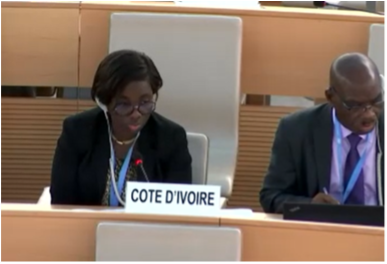 The Côte D’Ivoire, on behalf of the African Group, noted the disaggregated data gathering tools were vital in showing the scale of racism in interactions with law enforcement and will steer future responses. They added that the spirit and determination of the initial resolutions establishing the mandate should be taken into account, particularly ensuring its continued independence. In order to address lack of trust and combat systemic racism, leadership is required to bring about lasting changes and to assist law enforcement officers in fulfilling the responsibilities with equality and justice at the heart.
The Côte D’Ivoire, on behalf of the African Group, noted the disaggregated data gathering tools were vital in showing the scale of racism in interactions with law enforcement and will steer future responses. They added that the spirit and determination of the initial resolutions establishing the mandate should be taken into account, particularly ensuring its continued independence. In order to address lack of trust and combat systemic racism, leadership is required to bring about lasting changes and to assist law enforcement officers in fulfilling the responsibilities with equality and justice at the heart.
Djibouti’s representative stated that wide publication of data was essential, in 2022 in an interconnected world, certain countries continue to deny the existence of racism to justify their inaction under the protection of a spurious right to privacy or on the basis of a unique national identity. A balance should be made between the concerns pertaining to the right to privacy and the need to collect accurate statistics. The representative also imploded the Mechanism to work closely with other related UN bodies to work together to achieve shared goals.
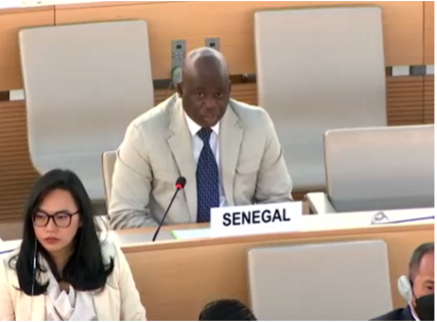 On behalf of Senegal, the representative noted the universal problem facing people of African descent, and particular women and girls. Senegal praised those countries that recognise the problem and hold people to account along with providing compensation. They also called on more countries to follow suit by implementing the 20 actions listed in the High Commissioner’s Transformative Programme for Justice and Equality including by ensuring oversight of processes by people of African Descent and ensuring their voices are heard worldwide.
On behalf of Senegal, the representative noted the universal problem facing people of African descent, and particular women and girls. Senegal praised those countries that recognise the problem and hold people to account along with providing compensation. They also called on more countries to follow suit by implementing the 20 actions listed in the High Commissioner’s Transformative Programme for Justice and Equality including by ensuring oversight of processes by people of African Descent and ensuring their voices are heard worldwide.
Egypt expressed its concern about the issues remaining and noted the essential step collecting data plays in helping move states’ understanding of systemic racism beyond the bare justification that cases are only isolated incidents. Can go further by adopting a comprehensive methodology to eradicate impunity and provide compensation to victims.
The delegate of Mauritania stated that a robust response was required to transform denial of a problem to concrete action in all areas, he also expressed support for the conclusions of the mechanism’s report. Thee delegate added that there is a need to accelerate implementation of international agendas to resolve deeply rooted discrimination problems.
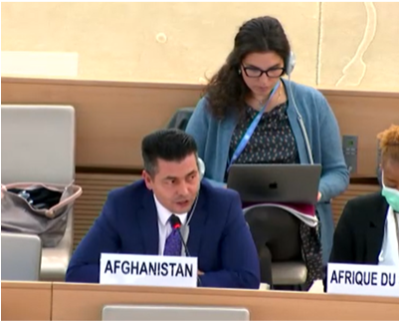 Afghanistan deplored terrorist attack that took place in a Hazara community area, a crime against humanity. They underlined the risk of further unthinkable tragedies that will occur in the absence of international actions. The Taliban brutally beat peaceful protestors while unleashing excessive violence. Ever since the takeover, no-one has been held accountable for atrocities committed by security services and the delegation asked the Mechanism how there can be judicial consequences for such actions.
Afghanistan deplored terrorist attack that took place in a Hazara community area, a crime against humanity. They underlined the risk of further unthinkable tragedies that will occur in the absence of international actions. The Taliban brutally beat peaceful protestors while unleashing excessive violence. Ever since the takeover, no-one has been held accountable for atrocities committed by security services and the delegation asked the Mechanism how there can be judicial consequences for such actions.
The representative of Togo deployed the continued denial of the existence of systemic racism in Western countries, widespread practice of criminal force used in violence against people of African descent. The delegation urged greater study of methodologies to collect insightful data and to publish better strategies for law enforcement to constructively engage in interactions with people of African descent.
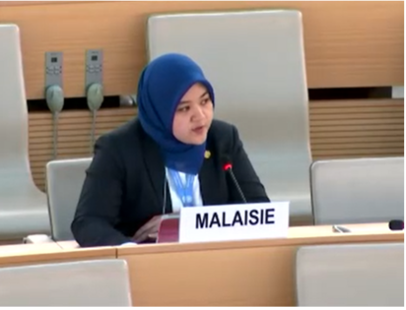 The Malaysian delegation express concern about manifestations of racial discrimination in law enforcement and supported all efforts to share respect and mutual understanding between people of different backgrounds. The delegation stated that there is a need for comprehensive evidence-based approaches to address historic injustices and contemporary manifestations of racial discrimination and a need to reject any disparities of treatment of people of African descent. Lastly, the delegation asked for more UN guidance on how to share awareness amongst law enforcement officials
The Malaysian delegation express concern about manifestations of racial discrimination in law enforcement and supported all efforts to share respect and mutual understanding between people of different backgrounds. The delegation stated that there is a need for comprehensive evidence-based approaches to address historic injustices and contemporary manifestations of racial discrimination and a need to reject any disparities of treatment of people of African descent. Lastly, the delegation asked for more UN guidance on how to share awareness amongst law enforcement officials
NGOs and Civil Society Organisations
A variety of NGOs and Civil Society Organisations contributed to the Interactive Dialogue and supported the movements to require better data collection including disaggregated data to allow for transparency. Many organisations criticised the poor data collection that prevents the public and victims from holding bodies accountable. Other common themes raised included the criticism of a states’ role in preventing accountability by protecting policing institutions to keep African people and people of African descent oppressed, not wanting the reality of the extent of discriminatory interactions to be revealed. Some solutions were suggested including diverting funding for law enforcement programmes towards more community based reconciliation interventions and greater scrutiny of states’ precise obligation to implement their international civil rights and social justice obligations.
Concluding Remarks
Remarks following the Enhanced Interactive Dialogue were given by each of the initial speakers who address the universal nature of the commitment to combat systemic racism and police brutality. They present on how the monitoring system and processes linked to the Mechanisms will help strengthen national investigations and heighten the involvement of civil society and the families of victims in achieving accountability.
On behalf of the Mechanisms, Justice Yvonne Mokgoro indicated that they would continue to hear directly from affected individuals to assist them to understand the ways in which racism and brutality violates multiple human rights. Whilst strengthening capacity is a key aim, she stressed that it was important not to duplicate efforts with other bodies. Nevertheless, country visits were vital to allow it to help strengthen the capacity of states to respond and align better to international standards on investigations, accountability, and standards governing law enforcement and the use of force.
Finally, the Acting United Nations High Commissioner for Human Rights called on States to engage meaningfully with the Expert Mechanism to Advance Racial Justice and Equality in Law Enforcement and take heed of the targeted recommendations that had been proposed through the Mechanism’s work including through sustained funding, public recognition of the serious of the issues, protection and support for programmes in this area.
Position of Geneva International Centre for Justice
More countries need to join the fight against egregious police brutality. Without urgent action across different states, the international community will have to consider a new international instrument - a convention against police brutality, which would bring to light the ways that international human rights are violated by police forces.
States should listen and act upon the concerns raised by people of African descent, and take measures on the ground, including concrete measures to reverse cultures of denial, to dismantle systemic racism, to end impunity for violations by law enforcement officials, and to deliver reparatory justice.
Racial Justice, No Justice No Peace, George Floyd, Policing, Human Rights, Geneva4Justice, GICJ, HRC51, Human Rights Council




